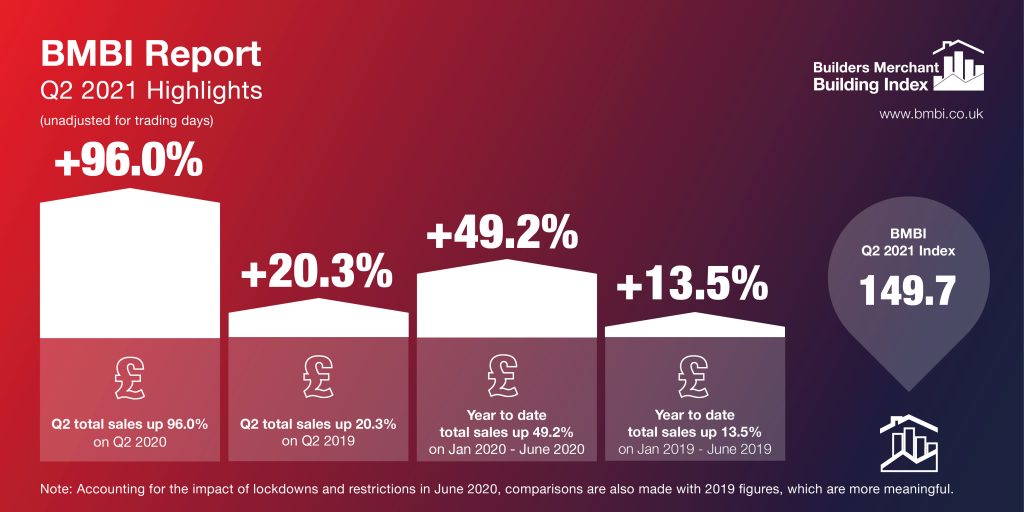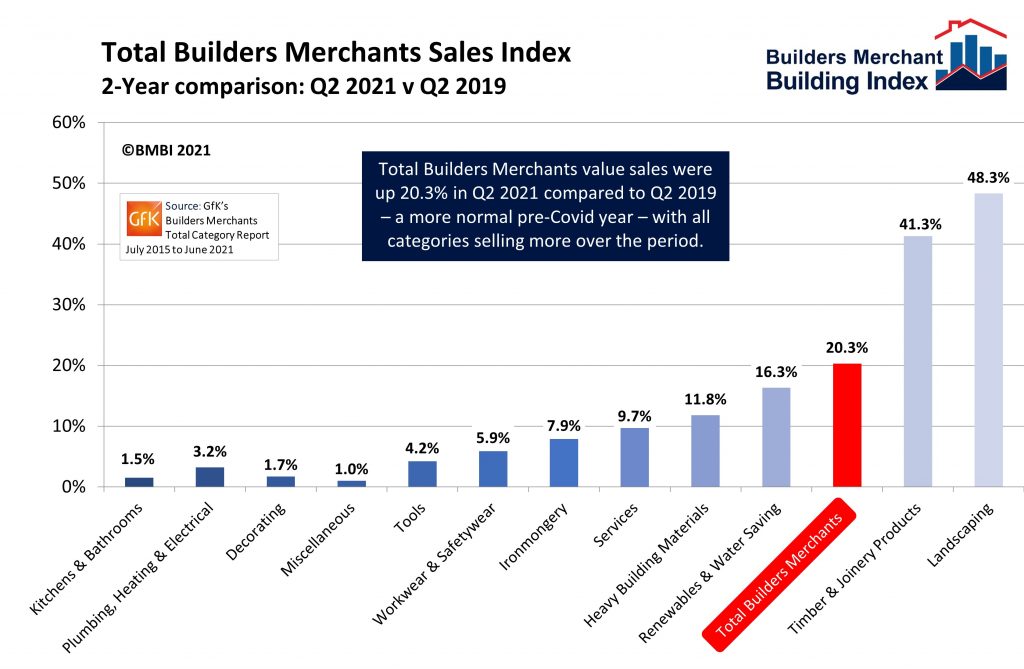RCI Column – June delivers record breaking sales for merchants in Q2

The latest figures from the Builders Merchants Building Index (BMBI), published last month, reveal that record breaking value sales in June helped Britain’s builders’ merchants hit their best ever quarter in Q2 2021 since the Index began in July 2014.

Quarterly sales, year-on-year
Total builders’ merchants value sales to builders, roofers and contractors were 96.0% higher in Q2 2021 than in Q2 2020, with no difference in trading days.
Tools (+151.4%) had the highest year-on-year increase, with kitchens and bathrooms (+141.3%) also reporting strong growth. Four categories had their best-ever quarterly sales, led by timber and joinery products (+134.6%).
Total sales were also up compared to Q2 2019 (+20.3%) – a more normal pre-COVID year – with all categories selling more over the period.

Quarter-on-quarter sales
Q2 total value sales were up 24.1% on Q1 2021 with two less trading days. Ten out of the 12 product categories sold more, with the seasonal landscaping category significantly ahead (+67.8%).
June sales, year-on-year
Total sales for June 2021 were 29.5% higher than the same month last year. Timber and joinery products recorded its highest ever BMBI monthly sales (+57.5%), despite continuing material shortages. Heavy building materials also chalked up its best-ever monthly sales (+22.7%).
June sales, month-on-month
Total sales for June 2021 were 11.1% higher than May, helped by three extra trading days.
All categories sold more, with workwear and safetywear (+16.7%), timber and joinery products (+15.2%) and kitchens and bathrooms (+12.2%) outperforming merchants generally.
Index
The Q2 BMBI Index was 149.7 with one less trading day. Landscaping (237.5) and timber and joinery products (183.0) were the strongest performers.
The Index for heavy building materials was also strong at 136.3.
Lynn Street, sales and marketing manager at Midland Lead and BMBI’s expert for lead, said: “The last few months have seen continued growth in the construction sector, but high demand is in stark contrast to staff shortages, logistics problems and price fluctuations.
“Our industry is still in a transitional period and no company is unaffected. We’ve also yet to see the full impact of the widening gap between demand and supply, with staff shortages in manufacturing, construction and retail, and a lack of drivers in distribution companies.”
Lynn continued: “Brexit was a huge disrupter in the distribution of raw materials and delivery of products, but that has now settled down as we have all got to grips with the additional legislation and paperwork. However, we are still reacting to unforeseen circumstances, such as the pingdemic that recently affected workforces. Coupled with construction’s well-documented skills shortage, this is extremely testing.
“Thankfully, we don’t have a problem sourcing raw materials (lead), as our sector is moving towards its busiest quarter. Logistics companies, manufacturers, customers, and end-users all need to work closely together, and communicate effectively, to mitigate the challenges that we will be facing.
“There is little we can do in the short term about distribution problems, but we can keep customers updated, so they can update their customers. Short term, the focus is on being agile and responsive, and working together to keep the supply chain moving. However, companies must keep looking at the long term and have a solid business strategy that keeps the future in focus.”
This column was published in the September issue of Roofing, Cladding & Insulation Magazine (RCI).



